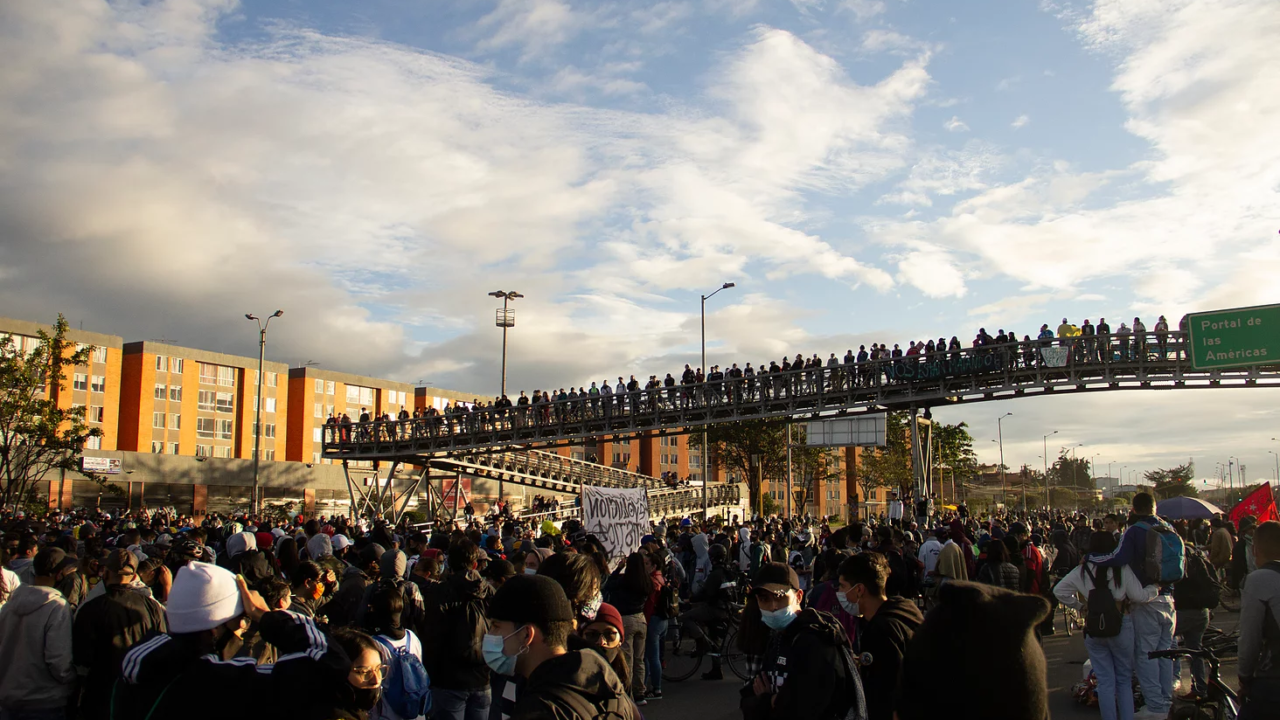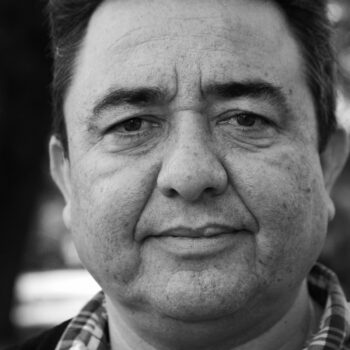Colombia’s President Iván Duque came to power two years ago on a neoliberal, pro-business agenda, promising more jobs and less taxes. His decision to break that promise two weeks ago couldn’t have come at a worse time: in the middle of a mortal pandemic that has hit Colombia harder than virtually any other country in the region. Duque proposed raising the sales tax, a form of taxation that most negatively impacts those with the least money to spend. The tax reforms are part of a broader “paquetazo neoliberal,” or “neoliberal package,” which also includes changes to the pension system, the healthcare system, and the labor code, all of which, if implemented, would put a greater squeeze on struggling Colombians.
The people’s response to the “tax reform” was massive and decisive. A coalition of unions and civic organizations called for a national strike on Wednesday, April 28, and hundreds of thousands of people from across Colombia poured into the streets. By Sunday, truck drivers had joined the strike, a move that forced Duque to withdraw the tax, and the Minister of Finance who authored it resigned. The government’s reversal was a victory for Colombians, but the strike continues. In response, the government has deployed the national police, the army, riot cops, and vigilantes, aiming to stop the mobilizations by brutalizing the population. Multiple videos show uniformed and non-uniformed police utilizing live ammunition against protesters in broad daylight. Cali has been the epicenter of the discontent, and the city that has borne the brunt of the government’s military response.
Wilson Sáenz is the president of Central Unitaria de Trabajadores, CUT, in Valle del Cauca, and the director of the federation’s human rights department. CUT is the biggest labor union federation in Colombia and one of the organizations behind the ongoing mobilizations. On May 14, we talked about the demonstrators’ demands, the government’s refusal to negotiate in good faith, and what it will take for the strike to come to an end. This interview has been edited and condensed.
Tell us about the strike.
[We are calling for] the repeal of Decree 1174, [the labor and pension reform] that would kill jobs but also introduce more “labor flexibility” to the market. Permanent contracts will be replaced by hourly hiring. This will also affect pensions. If a person had to work 25 years to be able to retire, at the moment, he would have to work for one hundred years. With [health] reform, if I have a catastrophic illness like cancer, cirrhosis, or I break my leg, I would have to pay additional insurance to cover each of those organs or limbs. They will privatize all health. Public health in Colombia would end. We are demanding this bill sinks.
The government hasn’t wanted to sit down to negotiate. Instead, it has gone after union leaders, human rights defenders, even United Nations personnel. In other words, there is a process of fascism in this country in which Iván Duque is just the figurehead, a puppet who doesn’t have the political capacity to solve a problem of this magnitude through dialogue and unity.
The movement has lasted longer than many people predicted, particularly since your initial demands were met so quickly. Even though this is a national movement, the epicenter is Cali. Why Cali?
First, because [we’ve shut down commercial activity in] the port of Buenaventura, where approximately 65 percent of goods enter Colombia. Second, Cali is the corridor to the south of the continent, the Panamerican Highway, where there are more inequalities, where there is more misery, where the rings of extreme poverty increase every day.
Since March 2020, 300,000 sources of employment have been lost in Cali alone. People who had restaurants, bars, fast food, they have also been left without their livelihood as a result of closures and the absence of governmental social investment. There is a hidden poverty among those small business owners because there is no money to patronize their businesses.
Yesterday, on the 13th day of continued mobilizations, the media reported about a meeting in Cali between leaders of the movement and representatives from every level of government. What happened?
I was in another meeting. But I’m going to give you a summary of what was presented. On one side, there were representatives of the people, who have set “points of resistance” — we have more or less 15 points of resistance throughout the city. These people are in the street, with barricades, blockading key intersections in and around the city. So they were going to present demands to the municipal, district, state, and national governments. What was the government’s answer? While they were all in the stadium, the police began to attack the points with firearms. If we are in a dialogue, obviously these aggressions must stop.
You got a victory early on with the tax reform, but clearly people want more. What needs to happen for the strike to end at this point?
We have made progress in sinking the tax reform. [Finance Minister Alberto] Carrasquilla has left. But we still have the other issues: the repeal of Decree 1174, which contains the labor and pension reform, and the end of the Bill 010, to further privatize healthcare. If dialogue is established, we will talk to the government, but the resistance points will stay; we’ll negotiate, but with an active strike, because we do not believe in this government. It has already betrayed Indigenous people, it has betrayed the truck drivers; they sign agreements and don’t comply with them. We are going to negotiate if and only if we maintain the concentration points, if we keep people in the streets telling this government that we are tired of so much aggression against the Colombian people.
What can people outside Colombia do to help?
Messages or letters to Colombia’s national government, one, rejecting the war response it has given to people’s legitimate protest, and two, demanding that a formal dialogue be established with the National Strike Committee and the other actors that are part of this great social outbreak. We very fraternally request that you make videos denouncing the human rights situation in Colombia. Help disseminate the information we send. Right now, the government is using the media to stop us. The fear is that right now, after progress is made in this strike, there will come an onslaught against those leaders who were at the forefront demanding better living conditions for the Colombian people.
Are you afraid for your life?
No. In my case, as a human rights defender and leader of the CUT, we are not afraid; we are moving forward. We believe that there will be changes in Colombia. We are not going to back down. We’re going to achieve [our] demands together, with the people and for the people.

